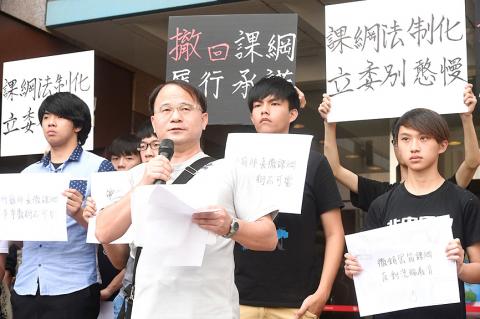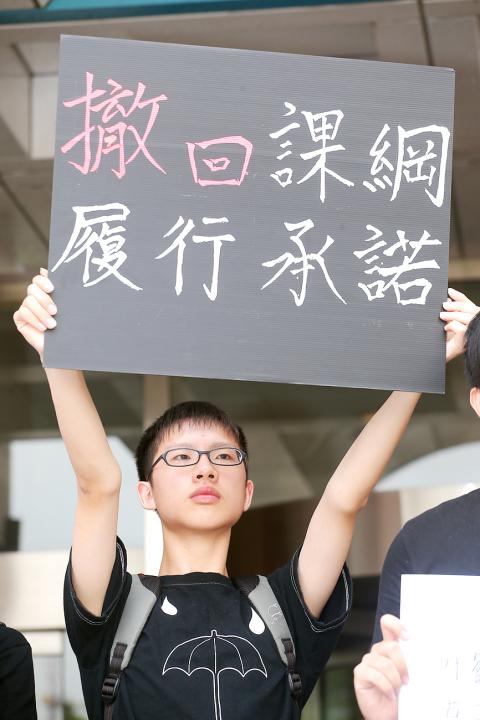Minister of education-designate Pan Wen-chung (潘文忠) should set a firm timeline for withdrawing controversial high-school curriculum guidelines, students said yesterday.
About 20 students protested in front of the Democratic Progressive Party’s (DPP) headquarters in Taipei, demanding that the DPP keep its promise to abolish the guidelines.
The allegedly China-centric focus and opaque approval process of last year’s “adjusted” guidelines sparked a student movement that saw the forecourt of the Ministry of Education compound in Taipei occupied by demonstrators.

Photo: George Tsorng, Taipei Times
“After winning the January elections, the DPP has only stated that it supports the students’ position. It has not promised to absolutely withdraw the guidelines after taking power on May 20,” Taipei Municipal Zhong-lun Senior High School student Lin Chih-yu (林致宇) said, adding that the DPP’s promises were in danger of becoming “feel-good” slogans.
Students said National Taiwan University social work professor Lin Wan-i (林萬億) — a top policy adviser to president-elect Tsai Ing-wen (蔡英文) — had promised them in December last year that the DPP would withdraw the guidelines should it win the elections.
Lin said he was concerned the DPP might backtrack after seeing it shift its position on the cross-strait trade in services agreement and related supervisory articles after January’s elections.

Photo: CNA
The DPP has drawn criticism for draft supervisory legislation that would exempt the trade in services agreement from new approval requirements, a key Sunflower movement demand.
Lin said premier-designate Lin Chuan’s (林全) comments that any decision on the guidelines would be up to Pan were another reason for concern, because Pan had been involved in their drafting in his previous role as administrative vice president of the National Academy for Educational Research.
Minister of Education Wu Se-hwa (吳思華) on Friday said Pan was personally responsible for overseeing the approval of the guidelines, which drew a sharp response from Pan, who said he was forced to relinquish oversight and withdraw from the process after having raised objections regarding procedures and the composition of the drafting committee.
“I was vice president of the National Academy for Educational Research at the time and I was supposed to oversee the development of curricula. However, I was relieved from the role because I was opposed to revisions of high-school curriculum guidelines, as the Ministry of Education did not make the revisions according to legal procedure and those who participated were not qualified to make the changes,” Pan said yesterday. “I was not involved in the process.”
Taiwan Grassroots Education Alliance member Chang Wen-lung (張文隆) said it was critical that Pan make his position clear, because teachers are in the process of choosing textbooks for the upcoming school year, with textbooks based on both the old and new guidelines available.
“If the minister-designate can make a clear statement that the guidelines will be abolished after May 20, it will be easy for teachers to choose,” he said. “As things stand, teachers are vacillating, because the government has not decided.”
In response, the DPP’s Department of Youth Affairs’ Huang Shou-ta (黃守達) said that withdrawing the controversial curriculum guidelines has always been the party’s official stance on the issue, adding that the DPP legislative caucus has proposed amendments to provide a legal framework for future changes to curriculum guidelines.
Last month, 65 DPP legislators proposed a motion demanding that the Executive Yuan and the ministry withdraw the adjustments to curriculum guidelines announced in February 2014.
“The proposal is now being negotiated between parties and could be voted on by Friday next week at the earliest,” he said.
The DPP caucus has also proposed amendments to the Senior High School Education Act (高級中等教育法) and the Primary and Junior High School Act (國民教育法) to make sure that curriculum guidelines will be decided in a professional manner, based on democratic principles and with the participation of the private sector, Huang said.
According to the proposed amendments, the ministry’s curriculum review committee is to be made a permanent organization instead of an ad hoc committee, with government representatives occupying less than one-fourth of seats on the committee, with the remainder filled by non-governmental representatives from educational institutions and groups recommended by the Legislative Yuan, Huang said.

Right-wing political scientist Laura Fernandez on Sunday won Costa Rica’s presidential election by a landslide, after promising to crack down on rising violence linked to the cocaine trade. Fernandez’s nearest rival, economist Alvaro Ramos, conceded defeat as results showed the ruling party far exceeding the threshold of 40 percent needed to avoid a runoff. With 94 percent of polling stations counted, the political heir of outgoing Costa Rican President Rodrigo Chaves had captured 48.3 percent of the vote compared with Ramos’ 33.4 percent, the Supreme Electoral Tribunal said. As soon as the first results were announced, members of Fernandez’s Sovereign People’s Party

EMERGING FIELDS: The Chinese president said that the two countries would explore cooperation in green technology, the digital economy and artificial intelligence Chinese President Xi Jinping (習近平) yesterday called for an “equal and orderly multipolar world” in the face of “unilateral bullying,” in an apparent jab at the US. Xi was speaking during talks in Beijing with Uruguayan President Yamandu Orsi, the first South American leader to visit China since US special forces captured then-Venezuelan president Nicolas Maduro last month — an operation that Beijing condemned as a violation of sovereignty. Orsi follows a slew of leaders to have visited China seeking to boost ties with the world’s second-largest economy to hedge against US President Donald Trump’s increasingly unpredictable administration. “The international situation is fraught

MORE RESPONSIBILITY: Draftees would be expected to fight alongside professional soldiers, likely requiring the transformation of some training brigades into combat units The armed forces are to start incorporating new conscripts into combined arms brigades this year to enhance combat readiness, the Executive Yuan’s latest policy report said. The new policy would affect Taiwanese men entering the military for their compulsory service, which was extended to one year under reforms by then-president Tsai Ing-wen (蔡英文) in 2022. The conscripts would be trained to operate machine guns, uncrewed aerial vehicles, anti-tank guided missile launchers and Stinger air defense systems, the report said, adding that the basic training would be lengthened to eight weeks. After basic training, conscripts would be sorted into infantry battalions that would take

GROWING AMBITIONS: The scale and tempo of the operations show that the Strait has become the core theater for China to expand its security interests, the report said Chinese military aircraft incursions around Taiwan have surged nearly 15-fold over the past five years, according to a report released yesterday by the Democratic Progressive Party’s (DPP) Department of China Affairs. Sorties in the Taiwan Strait were previously irregular, totaling 380 in 2020, but have since evolved into routine operations, the report showed. “This demonstrates that the Taiwan Strait has become both the starting point and testing ground for Beijing’s expansionist ambitions,” it said. Driven by military expansionism, China is systematically pursuing actions aimed at altering the regional “status quo,” the department said, adding that Taiwan represents the most critical link in China’s